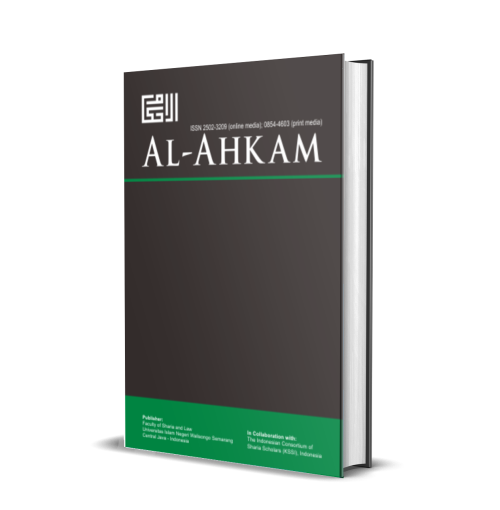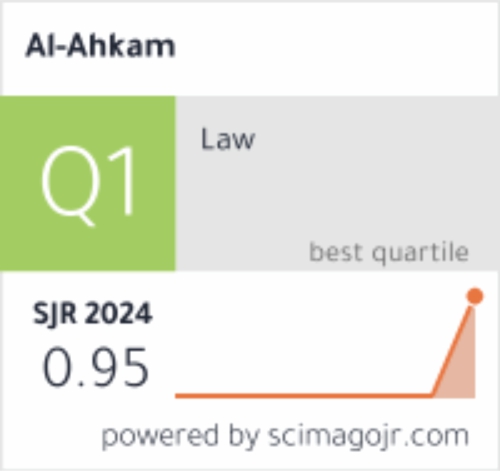Ṭāhā ‘Abd al-Raḥmān’s Philosophical Contribution to Theorize Ethical Maqāṣid
DOI:
https://doi.org/10.21580/ahkam.2023.33.2.17527Keywords:
ethic, ethical maqāṣid, maqāṣid, philosophical contributionAbstract
The ethical values of maqāṣid have been buried by the ḥarfiyyah-linguistic approach (ta’līlī-bayānī). The ethical paradigm of maqāṣid must be constructed to balance the ta’līlī-bayānī approach. This paper examines the philosophy of Ṭāhā ‘Abd al-Raḥmān in theorizing ethical maqāṣid. This paper focuses on two aspects. First, how does ‘Abd al-Raḥmān theorize the ethical maqāṣid? Second, how does ‘Abd al-Raḥmān conceptualize the relationship between Islamic law and ethics? This article is a literary research referring to some important books of ‘Abd al-Raḥmān. Using a moral philosophy approach, the writer concludes: first, ‘Abd al-Raḥmān’s ethical theorization of maqāṣid is a synthesis between ethics and uṣūl al-fiqh. This synthesis outlines the new pillars of maqāṣid. ‘Abd al-Raḥmān theoretically shifted legal reasoning from al-ta’līl al-sababī (attribute causality) to al-ta’līl al-ghā'i (maṣlaḥah causality). According to him, the only rationalization of Islamic law is maṣlaḥah, that is khuluq (ethics). Based on that premise, ‘Abd al-Raḥmān asserts that moderation is the accommodation of legal and ethical aspects of Islamic law. This paper recommends the importance of a moral philosophy approach to Islamic law. This approach is an effort to ground the maqāṣid in many legal cases loaded with morality.Downloads
References
Abou el Fadl, Khaled. “Qurʾanic Ethics and Islamic Law.” Journal of Islamic Ethics 1, no. 1–2 (2017): 7–28. https://doi.org/10.1163/24685542-12340002.
al-Attar, Mariam. Islamic Ethics: Divine Command Theory in Arabo-Islamic Thought. London: Routledge, 2010.
al-Attar, Mariam. “Meta-ethics: A Quest for an Epistemological Basis of Morality in Classical Islamic Thought.” Journal of Islamic Ethics 1, no. 1–2 (2017): 29–50. https://doi.org/10.1163/24685542-12340003.
Abdullah, M. Amin. “Bangunan Baru Epistemologi Keilmuan Studi Hukum Islam dalam Merespon Globalisasi.” Asy-Syir’ah: Jurnal Ilmu Syari’ah dan Hukum 46, no. 2 (2012): 315–68. https://doi.org/10.14421/ajish.v46i2.42.
Auda, Jasser. “A Maqāṣid - Based Approach for New Independent Legal Reasoning (Ijtihād).” In Islamic Perspectives on the Principles of Biomedical Ethics, 69–87, 2016. https://doi.org/10.1142/9781786340481_0003.
Belhaj, Abdessamad. “‘The Fall of the Western Family’ Ṭāhā ‘Abd al-Raḥmān’s Critical Islamic Ethics.” ReOrient 4, no. 1 (2018): 24–43. https://doi.org/10.13169/reorient.4.1.0024.
Brahimi, Mohamed Amine. “The Trusteeship Paradigm in the Social Sciences.” In Islamic Ethics and the Trusteeship Paradigm: Taha Abderrahmane’s Philosophy in Comparative Perspectives, edited by Mohammed Hashas and Mutaz al-Khatib, 218–31. Netherlands: Brill, 2020. https://doi.org/10.1163/9789004438354_012.
Duderija, Adis, ed. Maqasid al-Shari’a and Contemporary Reformist Muslim Thought: An Examination. London: Palgrave Macmillan, 2014. https://doi.org/10.1057/9781137319418.
Harisudin, M. Noor, and Muhammad Choriri. “On the Legal Sanction Against Marriage Registration Violation in Southeast Asia Countries: A Jasser Auda’s Maqasid al-Shariah Perspective.” Samarah: Jurnal Hukum Keluarga dan Hukum Islam 5, no. 1 (2021): 471–95. https://doi.org/10.22373/sjhk.v5i1.9159.
Harvey, Ramon. “Qurʾanic Values and Modernity in Contemporary Islamic Ethics.” In Islamic Ethics and the Trusteeship Paradigm: Taha Abderrahmane’s Philosophy in Comparative Perspectives, edited by Mohammed Hashas and Mutaz al-Khatib, 150–69. Netherlands: BRILL, 2020. https://doi.org/10.1163/9789004438354_009.
Hashas, Mohammed. “Taha Abderrahman’s Trusteeship Paradigm: Spiritual Modernity and the Islamic Contribution to the Formation of a Renewed Universal Civilization of Ethos.” Oriente Moderno 95, no. 1–2 (2015): 67–105. https://doi.org/10.1163/22138617-12340077.
Hashas, Mohammed. “The Trusteeship Paradigm: The Formation and Reception of a Philosophy.” In Islamic Ethics and the Trusteeship Paradigm: Taha Abderrahmane’s Philosophy in Comparative Perspectives, edited by Mohammed Hashas and Mutaz al-Khatib, 37–61. Netherlands: Brill, 2020. https://doi.org/10.1163/9789004438354_004.
Hashas, Mohammed, and Mutaz al-Khatib, eds. Islamic Ethics and the Trusteeship Paradigm: Taha Abderrahmane’s Philosophy in Comparative Perspectives. Netherlands: Brill, 2020. https://doi.org/10.1163/9789004438354.
Hayat, Azmat, Muhammad Shafiai, and Muhammad Hakimi. “The Nature of Public Interest in Muslim and Non-Muslim Writers.” MPRA - Munich Personal RePEc Archive, 2019. https://mpra.ub.uni-muenchen.de/94153/.
Iqbal, Muhammad. “Konsep I’timaniya dalam Pandangan Taha Abdurrahman.” Jurnal Yaqzhan: Analisis Filsafat, Agama dan Kemanusiaan 9, no. 1 (2023): 55–72. https://doi.org/10.24235/jy.v9i1.12891.
Kepplinger, Eva. “Taha Abderrahmane and Abū Isḥāq Al-Shāṭibī.” In Islamic Ethics and the Trusteeship Paradigm: Taha Abderrahmane’s Philosophy in Comparative Perspectives, edited by Mohammed Hashas and Mutaz al-Khatib, 62–77. Netherlands: Brill, 2020. https://doi.org/10.1163/9789004438354_005.
Moosa, Ebrahim. “On Reading Shatibi in Rabat and Tunis.” The Muslim World Journal 104 (2014): 451–464.
Munir Birouk. “Taha Abderrahman’s Moral and Spiritual Foundations of Dialogue.” Global Media Journal 9, no. 2 (2016): 868–74.
Nurul Ihsannudin. “Hadis Akhlak dan Filsafat Etika Taha Abdurrahman: Kritik Modernitas dan Tawaran Alternatif.” Refleksi Jurnal Filsafat dan Pemikiran Islam 23, no. 1 (2023): 28–52. https://doi.org/10.14421/ref.v23i1.3968.
Prabowo, M. Nuryono, and Albar Adetary Hasibuan. Pengantar Studi Etika Kontemporer: Teoritis dan Terapan. Malang: UB Press, 2017.
Rizky HK., Muhammad. “Membaca Pemikiran Taha Abdurrahman tentang Etika Politik Islam.” Politea: Jurnal Politik Islam 3, no. 2 (2020): 273–86. https://doi.org/10.20414/politea.v3i2.2339.
al-Raḥmān, Ṭāhā ’Abd. al-’Amal al-Dīn wa Tajdīd al-’Aql. Beirut: al-Markaz al-Thaqāfi al-’Arabī, 1997.
al-Raḥmān, Ṭāhā ’Abd. “Mashrū’ Tajdīd ’Ilmi li Mabḥath Maqāṣid al-Sharī’ah.” al-Muslim al-Mu’ashir, 2002. https://almuslimalmuaser.org/2002/03/01/مشروع-تجديد-علمي-لمبحث-مقاصد-الشريعة/أبحاث/.
al-Raḥmān, Ṭāhā ’Abd. Su`āl al-Akhlāq: Musāhamah fī al-Naqdi al-Akhlāqi li al-Hadāthah al-Gharbiyyah. Maghrib: al-Markaz al-Thaqāfi al-’Arabī, 2000.
al-Raḥmān, Ṭāhā ’Abd. Tajdīd al-Manhaj fī Taqwīm al-Turāth. Beirut: al-Markaz al-Thaqāfi al-’Arabī, 1993.
Rohmanu, Abid. Reinterpretasi Jihad: Relasi Fikih dan Akhlak. Ponorogo: STAIN Po. Press, 2012.
Saeed, Abdullah. The Qur’an: An Introduction. London: Routledge, 2008.
Saifuddin, Ahmad Farid, and Boma Panji Astha Tulung. “al-’Aql wa ’Alaqatuhu bi al-Din inda Thoha Abdurrahman.” Tasfiyah: Jurnal Pemikiran Islam 5, no. 1 (2021): 137–64. https://doi.org/10.21111/tasfiyah.v5i1.5693.
el-Yousfi, Amin. “The Anthropology of Islam in Light of the Trusteeship Paradigm.” In Islamic Ethics and the Trusteeship Paradigm: Taha Abderrahmane’s Philosophy in Comparative Perspectives, edited by Mohammed Hashas and Mutaz Al-Khatib, 197–217. Netherlands: BRILL, 2020. https://doi.org/10.1163/9789004438354_011.
Zatari, Fadi. “Entrustment Ethics and Secularism: Taha Abdurrahman’s Perspective.” Darulfunun Ilahiyat 33, no. 1 (2022): 303–10. https://doi.org/10.26650/di.2022.33.1.1077851
Downloads
Published
How to Cite
Issue
Section
License
By submitting an article to the journal, the author(s) agree to transfer the published article's copyright to the journal, which will act as the publisher. This means the journal will have the right to publish the article in various forms, including reprints. The journal will maintain the publishing rights to the published articles.
In line with the license, authors and third parties (readers, researchers, and others) are allowed to share and adapt the material. In addition, the material must be given appropriate credit, provided with a link to the license, and indicated if changes were made. If authors remix, transform or build upon the material, authors must distribute their contributions under the same license as the original.



